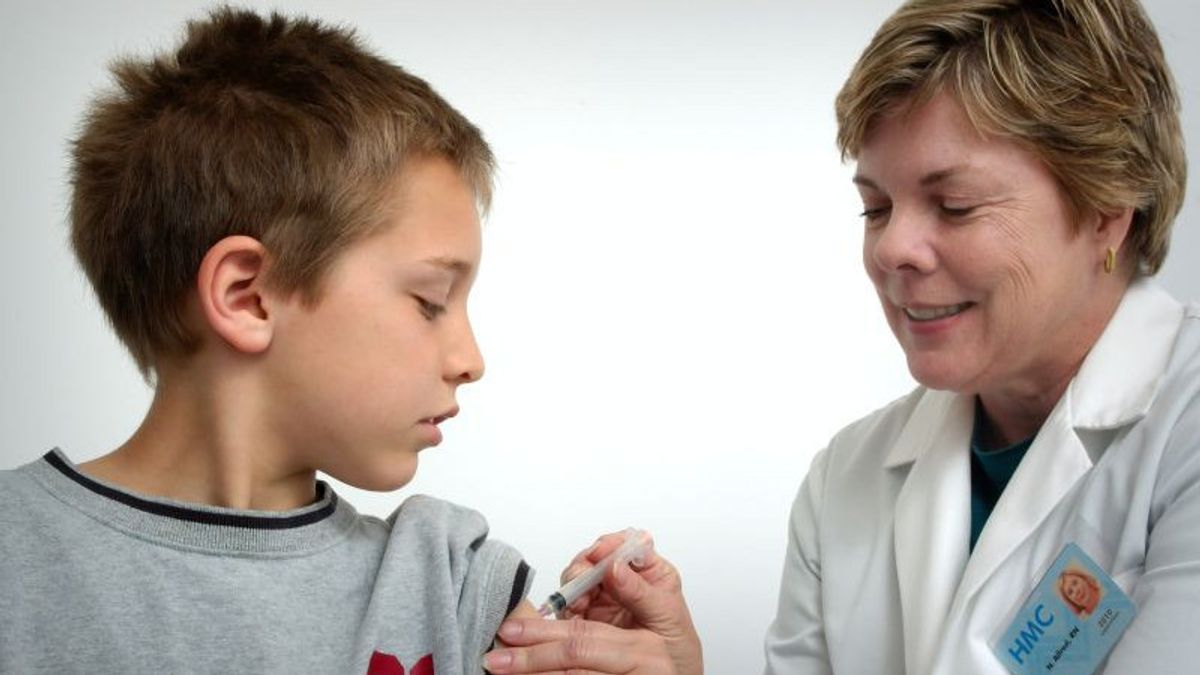JAKARTA - The Indonesian Pediatrician Association (IDAI) issued the latest recommendations for COVID-19 vaccination for children aged 6-11 years as of December 16, 2021.
“There are some changes related to some findings or the results of discussions with many parties. From the previous recommendation, namely the one in November, there are several changes to the December 16 update," said the General Chair of IDAI, dr. Piprim Basarah Yanuarso, SpA(K) during a virtual press conference, Antara, Friday, December 17.
Currently, IDAI recommends that children with comorbid diseases such as stable chronic conditions may be immunized after receiving recommendations from the treating doctor. According to IDAI, they have a higher risk of developing complications if they are infected with COVID-19.
"In the field, children with chronic conditions are often rejected, but IDAI actually confirms that children with chronic but stable conditions, such as congenital heart disease but his condition is stable, diabetes mellitus but blood sugar is controlled, or autoimmune conditions are controlled, which is like Instead, they have to get vaccinated because if they get COVID-19 the risk is higher,” explained Piprim.
In addition, children who have recovered from COVID-19, including those with long COVID-19, need to be vaccinated against COVID-19. However, for children suffering from severe COVID-19 or MIS-C (Multi System Inflammantory Syndrome in Children), the COVID-19 vaccination is postponed for 3 months, while for mild to moderate degrees it can be delayed for 1 month.
IDAI also recommends that children with special needs, children with developmental and behavioral disorders, and children in orphanages/protections need to be vaccinated against COVID-19 through a special approach to implementation.
Lastly, if previously the distance between the COVID-19 vaccine and other vaccines was at least 4 weeks, now IDAI recommends a minimum of 2 weeks. "Because COVID-19 vaccines such as Sinovac, Coronavac, or biopharma vaccines, including dead vaccines, there is no problem with a 2-week gap," said Piprim.
The Head of the IDAI Immunization Task Force Prof. Dr. Hartono Gunardi, SpA(K) added that the School Child Immunization Month (BIAS) vaccination program should be carried out first.
However, if the school has brought in the COVID-19 vaccine, then it doesn't matter if the child is given the COVID-19 vaccine first and after 2 weeks, the BIAS immunization is carried out.
"Or if, for example, in an area that is still waiting for the COVID-19 vaccine to arrive, please first immunize BIAS, only then be given the COVID-19 vaccination," continued Hartono.
Piprim emphasized that catch-up immunization is also very important because it can prevent more dangerous diseases, especially if the decrease in vaccination coverage is below 60 percent, it can cause extraordinary events (KLB) to reappear.
"For example, from 30,000 cases of diphtheria who died of diphtheria, 3,000 died, so the case fatality rate is around 10 percent, while COVID-19 is 1 percent," he said.
Meanwhile, IDAI also underlined several diseases that require special attention before a child is vaccinated against COVID-19 with a note of consideration from a doctor and immunizations are carried out in a hospital, including:
- Primary immune deficiency, uncontrolled autoimmune disease
- Children with cancer who are undergoing chemotherapy/radiotherapy
- Fever 37.50 C or more
- Chronic diseases or congenital abnormalities not controlled
Uncontrolled diabetes mellitus, adrenal insufficiency such as CAH (Congenital Adrenal Hyperplasia), Addison's disease
- Bleeding disorders such as hemophilia
- Liver and kidney transplant patients
- Severe allergic reactions such as shortness of breath, generalized urticaria
Meanwhile, the following are a number of contraindications or conditions that are prohibited from being vaccinated against COVID-19 in children:
- Anaphylactic reactions due to vaccine components in previous vaccinations
- Guillain-Barre syndrome, transverse myelitis, acute demyelinating encephalomyelitis
- Are receiving severe immunosuppressant/cytostatic treatment
- In the last 7 days the child was hospitalized, or experienced an emergency such as shortness of breath, seizures, unconsciousness, palpitations, bleeding, hypertension, severe tremor.
The English, Chinese, Japanese, Arabic, and French versions are automatically generated by the AI. So there may still be inaccuracies in translating, please always see Indonesian as our main language. (system supported by DigitalSiber.id)













